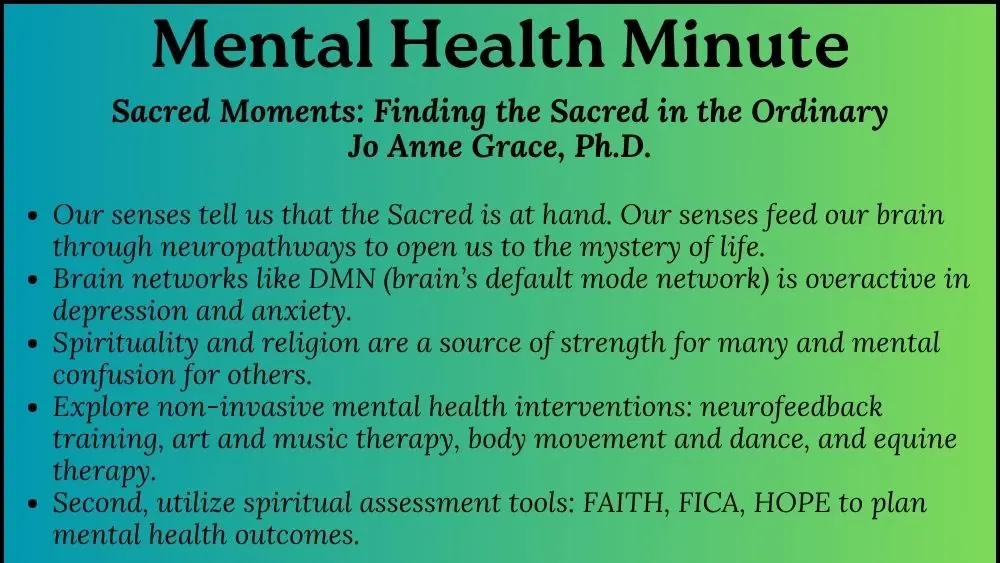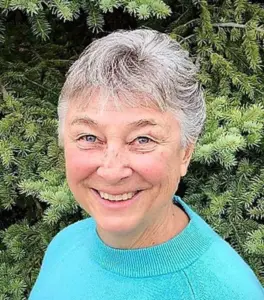
(Graphics provided to Steamboat Radio.) This is a weekly update. Visit YampaValleyResources.org today to explore all the resources available for you and your household. Together, we are working to create a stronger, more resilient Yampa Valley where everyone has access to the resources they need to thrive.
Links to past Mental Health Minutes are below.

Sacred Moments: Finding the Sacred in the Ordinary
Jo Anne Grace, Ph.D.
Have you ever gazed at a sunrise or sunset and been filled with a sense of awe at the beauty of creation? Have you ever witnessed the birth of a baby and been filled with a sense of wonder? Have you ever hugged a person and been filled with a sense of joy?
Then, you know how to find the Sacred in the Ordinary. Our senses tell us that the Sacred is at hand. Our senses feed our brain through neuropathways to open us to the mystery of life. This mystery is a paradox. It invites us into the mystical by uniting physical reality with spiritual certainty. It is here that we discover that our ordinary lives are infused with a sacred life-source greater than ourselves.
So, what does this have to do with mental health?
Neuroscience is beginning to shed light on how spiritual and sacred experiences impact the brain. Brain networks like DMN (brain’s default mode network) is overactive in depression and anxiety. Spiritual practices calm this network when the mind employs the Faith Factor, Herbert Benson, MD, researched this at Duke in 1970. Explore this for yourself. Pay attention to your breath. Exhale and say the word one. Inhale and exhale, saying the word one each time you exhale. Repeat seven times. Now, choose a value word: love, peace, compassion. Focus your breath. Exhale to the word you chose. Inhale and repeat the word, breathing the word through your body, seven times. What difference does this make to your mental health when you focus the mind and calm the brain?
Neurochemical effects take place when spiritual practices are cultivated. They alter levels of neurotransmitters like serotonin and dopamine, which are associated with feelings of happiness and well-being. Discover what happens when you trigger serotonin and dopamine. Imagine a place where you are connected with nature. It may be walking on a beach, hiking on a trail, or sitting by a stream. It may be in the company of others gathered in worship. Allow yourself to reexperience the Sacred in the ordinary. What difference does this make to your mental health when you recall and relive a sacred time and place?
Mental health and sacred moments of awe and wonder are deeply connected.
Sacred moments are the foundation from which spiritual and religious worldviews are established. They are personally codified (spirituality) and communally dogmatized (religion.) They can be both beneficial and harmful to mental health.
Spirituality and religion are a source of strength for many.
- A sense of purpose: A spiritual framework provides perspective and offers meaning to life’s hardships, reducing feelings of hopelessness and increasing overall life satisfaction.
- Connection to the Sacred: Spiritual practices such as prayer, meditation, and mindfulness alleviate symptoms of anxiety and depression and foster inner peace.
- Community support: Religious and spiritual communities provide a vital social network, combating loneliness and isolation and offering physical and emotional support during difficult times.
- Hope and resilience: A worldview that includes faith, belief, and values strengthens one’s ability to persevere through adversity and thrive with compassion to embrace life.
Spirituality and religion are a source of mental confusion for others.
- Spiritual struggles: Conflict between external religious authorities and internal spiritual experiences can lead to invalidation, abandonment, or judgment, resulting in feelings of anxiety, guilt, and depression.
- Spiritual abuse: Traumatic experiences in spiritual or religious settings: abuse by a religious leader or exclusion based on sensual feelings or sexual orientation can be deeply damaging.
- Extremism and rigidity: Inflexible, dogmatic, and embedded beliefs can lead to a shattering of identity and negative coping behaviors, resulting in a heightened sense of anxiety or hopelessness.
- Interference with treatment: A person’s spiritual beliefs may prevent them from seeking or following conventional medical recommendations, including mental health treatment
The practicality of experiencing sacred moments by finding the sacred in the ordinary is two-fold. First, discover how it impacts your own mental health. Cultivate a spiritual practice that makes sense to you. Explore non-invasive mental health interventions: neurofeedback training, art and music therapy, body movement and dance, and equine therapy. Second, utilize spiritual assessment tools: FAITH, FICA, HOPE to plan mental health outcomes. Collaborate with spiritual health professionals, chaplains, and religious leaders to refer and practice interdisciplinary care. Be mindful of ethical values and cultural rituals that enhance mental health.
Please feel free to contact Dr. Jo Anne Grace with your comments and questions. She welcomes your feedback and invites a conversation about mental health. Jo Anne was voted 2025 Best of the Boat for Mental Health. She serves as Chaplain for Northwest Colorado Health’s Hospice Program and has a private practice in NeuroHealth. Dr. Grace can be reached at 970.404.0627 or visit her website at joanne-grace.com.
Spirituality explores worldviews to find meaning, build resilience, and foster community, which positively impacts mental well-being. Practices like prayer and meditation can calm the mind, while religious or spiritual communities offer support, reducing loneliness and providing a sense of belonging. Conversely, a lack of spirituality can sometimes be a factor in psychiatric disturbances, though certain religious beliefs or practices can also negatively impact mental health.
- Psychedelic-assisted therapy: Research into psychedelics, which can trigger profound mystical and spiritual experiences, shows potential in treating conditions like addiction by disrupting the DMN and promoting shifts in perception and well-being.
“Current research on spirituality, religiousness, and mental health shows the impact on physical and mental health outcomes. On the one hand, religion involves beliefs, practices, and rituals related to the transcendent; on the other hand, spirituality is a broader concept, which includes the personal quest for understanding answers to ultimate questions about life, life meaning, and relationship with the sacred or transcendent.” https://pmc.ncbi.nlm.nih.gov/articles/PMC8462234/
The sacred in therapy
Therapy that acknowledges the sacred dimension of a person’s life is becoming an increasingly important component of holistic mental health care.
- Spiritually Integrated Psychotherapy (SIP): This approach directly addresses a client’s spiritual concerns using psychological methods and is rooted in the idea that exploring one’s spirituality can be a powerful catalyst for healing and growth.
- Assessment tools: Mental health professionals can use formal spiritual assessments, such as FICA or HOPE, to understand a client’s spiritual background and how their beliefs may influence treatment.
- Collaboration: Therapists can collaborate with spiritual leaders to provide comprehensive care that respects a person’s faith while remaining grounded in effective clinical practice.
- Holistic perspective: Many healthcare systems now embrace a bio-psycho-social-spiritual model, recognizing that a person’s well-being is determined by the interplay of these various dimensions.
- Ethical considerations: Therapists must be mindful of not imposing their own beliefs, remaining culturally competent, and recognizing when to refer clients to appropriate spiritual guides.
This is for informational purposes only. For medical advice or diagnosis, consult a professional. AI responses may include mistakes. Learn more
This is the continued Mental Health Minute, beginning July 7, 2025.
- Oct. 13, 2025 — Mental Health Minute — Talk Saves Lives: Empowering Our Community to Prevent Suicide
- Oct. 6, 2025 — Mental Health Minute — Cost of Poverty Experience (COPE) comes to Northwest Colorado
- Sept. 29, 2025 — Mental Health Minute — Get Immediate Support with the 988 Colorado Mental Health Line
- Sept. 22, 2025 — Mental Health Minute — Theater as an Outlet
- Sept. 14, 2025 –Mental Health Minute — Connection in Times of Adversity
- Sept. 7. 2025 — Mental Health Minute – Sharing stories and building bridges at new event
- Aug. 31, 2025 — Mental Health Minute — Message from Yampatika
- Aug. 25, 2025 — Mental Health Minute — Mental Health After a Critical Incident: How to Help, What to Expect, and Taking Care of Yourself
- Aug. 17, 2025 — Mental Health Minute: Uncertainty Is Part of Life — But It’s Heavier for Some
- Aug. 11, 2025 — Mental Health Minute — Re:generation: A Christ-Centered Path to Lasting Transformation
- Aug. 3, 2025 — Mental Health Minute — Steps to Help Save A Life
- July 28, 2025 — Mental Health Minute — Steamboat Kids & Phones
- July 24-2025 — Mental Health Minute — Starting with the basics
- July 15, 2025 — Mental Health Minute – Helping Others through Peer Engagement and The HOPE Initiative
- LINK to all previous Mental Health Minutes — DECEMBER 1, 2024, THROUGH JUNE 23, 2025